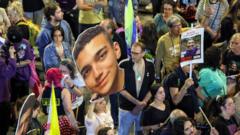In a wave of protests focused on KFC locations across Pakistan, tensions have escalated, resulting in one fatality and numerous arrests, as public outcry against the conflict in Gaza intensifies.
Violence Erupts in Pakistan as Protests Target KFC Amid Gaza War Tensions

Violence Erupts in Pakistan as Protests Target KFC Amid Gaza War Tensions
Dozens arrested as protests against KFC lead to fatal shooting of an employee in Sheikhupura.
Authorities in Pakistan have taken strict measures as protests against KFC escalate, leading to chaos in several cities. The unrest has been linked to a broader movement advocating for a boycott of the popular fast-food chain, which protesters decry as a symbol of U.S. support for Israel amid ongoing violence in Gaza.
Over the course of the past week, authorities recorded at least 20 incidents targeting KFC outlets throughout the country. These protests culminated tragically when a KFC employee named Asif Nawaz was shot and killed during a protest in Sheikhupura, near Lahore. Nawaz, 45, was struck by a bullet during a chaotic scene when rioters, armed with iron rods, attempted to vandalize the store. Initial reports suggest that the shooting may have been accidental, with ongoing investigations revealing that the main suspect remains at large despite 40 arrests made by police.
In response to the violence, Pakistan's Minister of State for the Interior, Talal Chaudhry, condemned the riots, pointing out that many of the store employees are local citizens and that the profits primarily benefit Pakistanis. He highlighted that the protests are largely a reaction to ongoing tensions regarding the Gaza conflict, with prominent groups like Tehreek-e-Labbaik Pakistan (TLP) calling for boycotts against U.S. interests but denying any links to the violent protests.
Notable Islamic leaders, including the influential Sunni scholar Mufti Taqi Usmani, have advocated for non-violent expressions of dissent, urging protesters to avoid any actions that could endanger lives. Usmani emphasized the importance of peaceful protests, stating that Islam does not endorse violence.
In an environment marked by rampant boycotts, previous cases like McDonald's, which retracted its business in Israel due to backlash, illustrate the intensity of consumer sentiment regarding western brands in Muslim-majority countries. KFC and its parent company, Yum Brands, have yet to respond to inquiries regarding the ongoing situation.
As tensions remain high, the ongoing protests reflect the struggle within Pakistan over the intersection of global conflicts and local sentiments, driving individuals to express their frustration in increasingly volatile ways.
Over the course of the past week, authorities recorded at least 20 incidents targeting KFC outlets throughout the country. These protests culminated tragically when a KFC employee named Asif Nawaz was shot and killed during a protest in Sheikhupura, near Lahore. Nawaz, 45, was struck by a bullet during a chaotic scene when rioters, armed with iron rods, attempted to vandalize the store. Initial reports suggest that the shooting may have been accidental, with ongoing investigations revealing that the main suspect remains at large despite 40 arrests made by police.
In response to the violence, Pakistan's Minister of State for the Interior, Talal Chaudhry, condemned the riots, pointing out that many of the store employees are local citizens and that the profits primarily benefit Pakistanis. He highlighted that the protests are largely a reaction to ongoing tensions regarding the Gaza conflict, with prominent groups like Tehreek-e-Labbaik Pakistan (TLP) calling for boycotts against U.S. interests but denying any links to the violent protests.
Notable Islamic leaders, including the influential Sunni scholar Mufti Taqi Usmani, have advocated for non-violent expressions of dissent, urging protesters to avoid any actions that could endanger lives. Usmani emphasized the importance of peaceful protests, stating that Islam does not endorse violence.
In an environment marked by rampant boycotts, previous cases like McDonald's, which retracted its business in Israel due to backlash, illustrate the intensity of consumer sentiment regarding western brands in Muslim-majority countries. KFC and its parent company, Yum Brands, have yet to respond to inquiries regarding the ongoing situation.
As tensions remain high, the ongoing protests reflect the struggle within Pakistan over the intersection of global conflicts and local sentiments, driving individuals to express their frustration in increasingly volatile ways.



















